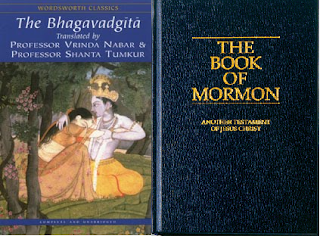I read the Bhagavad Gita some time ago, and wrote my impressions and favorite passages in a Previous Post.
This last month I've been thinking about all the similarities between the Hindu Religion and the LDS (Mormon) religion.
This last month I've been thinking about all the similarities between the Hindu Religion and the LDS (Mormon) religion.
So I went back and found 10 themes or lessons in the Bhagavad Gita that have very similar messages in the Mormon canon of scripture. With my limited understanding of Hindu, I have attempted to show the similarities I found:
1. How is Deity received when he appears amongst his followers, looking like them?
Gita 9:11 - “The foolish do not respect me in
this human form, failing to know My supremely excellent form, that of the
highest Lord of all creation.”
Krishna is the Lord of all creation, and is
not respected when in human form.
John
1:10 - “He was in the
world, and the world was made by him, and the world knew him not.”
Isaiah 53:3 – “He
was despised, and we esteemed him not.”
Christ
created the world, and when he came in human form, he was rejected.
2. Man wants to see Deity, and asks to - but man cannot see Him with natural eyes.
Gita 11:4 - “O Lord, if
You hold that it is possible for me to behold it, then, O Lord of Yoga, show me
Your imperishable form.”
Ether 3:10 – “Lord, show
thyself unto me.”
Gita 11:8 - “But you cannot view Me with these
eyes of yours. I am bestowing supernatural sight upon you – behold My
divine Yoga.”
D&C 84:21,22 – “without the
authority of the priesthood, the power of godliness is not manifest unto men in
the flesh; for without this no man can see the face of God, even the Father,
and live.”
3. When Deity is seen, he is brighter than any light we have seen or can imagine.
Gita 11:12 - “Were the
radiance of a thousand suns to blaze forth at one go in the sky, it might
approximate the magnificence of this exalted being.”
Sanjaya describes the radiance and glory of
Lord Krishna
JSH 1:16-17 – “I saw a pillar of light
exactly over my head, above the brightness of the sun…When
the light rested upon me I saw
two Personages,
whose brightness and glory
defy all description.
Joseph Smith describes the Radiance and Glory of God and Jesus Christ
4. Deity can forgive man of all sins.
Gita 18:66 - “I shall release you from all
sins, have no more fear.”
D&C 76:41 – “He
came into the world, even Jesus, to be crucified
for the world, and to bear the sins of the world, and to
sanctify the world, and to cleanse it from all
unrighteousness.”
5. Deity on occasion asks man to do very difficult things - like kill.
Gita 1:35 - “These I would not wish to kill
though they have risen to kill us.”
Arjuna is commanded to kill his brethren,
and he asks if they can be spared, if he can be saved the task of killing
them. Krishna explains why he must kill
them.
1 Nephi 4:10 – “I was constrained by the Spirit that I should kill
Laban; but I said in my heart: Never at any time have I shed the blood of man.
And I shrunk and would that I might not slay him.”
Nephi is commanded to kill a fellow citizen
of Jerusalem, Laban, and makes much the same request as Arjuna, until the Spirit
of the Lord tells him why Nephi must kill Laban.
6. Deity is eternal, and Man is also eternal.
Gita 2:12 - “There was never a time when
either I, or you, or these rulers of men did not exist. Nor will there
ever be a future when all of us will cease to exist.”
Krishna explains
that Diety and man have always existed, and always will.
D&C 93:29 – “Man was also in the beginning with God.”
The Lord explains to
Joseph Smith that Man was with God from the very beginning.
Abraham 3:22 – “Now
the Lord had shown unto me, Abraham, the intelligences
that were organized before the world was; and among all these there
were many of the noble and great ones”
The Lord shows Abraham
the souls of men before they came to earth.
7. Diet, exercise, and moderation are important.
Gita 6:17 - “He who is moderate in food and play, disciplined in his actions,
and controlled in sleep or keeping awake achieves a yoga which destroys all
pain.”
Krishna teaches moderation in food, play,
and sleep in order to destroy pain.
D&C 89 – All men who avoid Strong Drink, Tobacco, and Hot
Drinks and also use grains, fruits and meats jusdiciously “shall run and
not be weary, and shall walk and not faint.”
The
Lord teaches Joseph Smith a law of health, and moderation in all things in
order to gain indefatigable strength.
8. Very few people attempt to and will ever reach perfection.
Gita 7:3 - “Out of thousands of men, hardly
one attempts to reach perfection."
Matthew 7:14 – “strait is the gate, and narrow is the way, which
leadeth unto life, and few there be that find it.
9. Deity asks us to remember him at all times.
Gita 8:7 - “Remember me at all times”
3 Nephi 18:7 – “If
ye do always remember
me ye shall have my Spirit to be with you.”
10. Man is what he believes.
Gita 17:3 – “Man is composed of his faith – as
his faith is, so is he formed”
Proverbs 23:7 “For
as he thinketh in his heart, so is he.”




